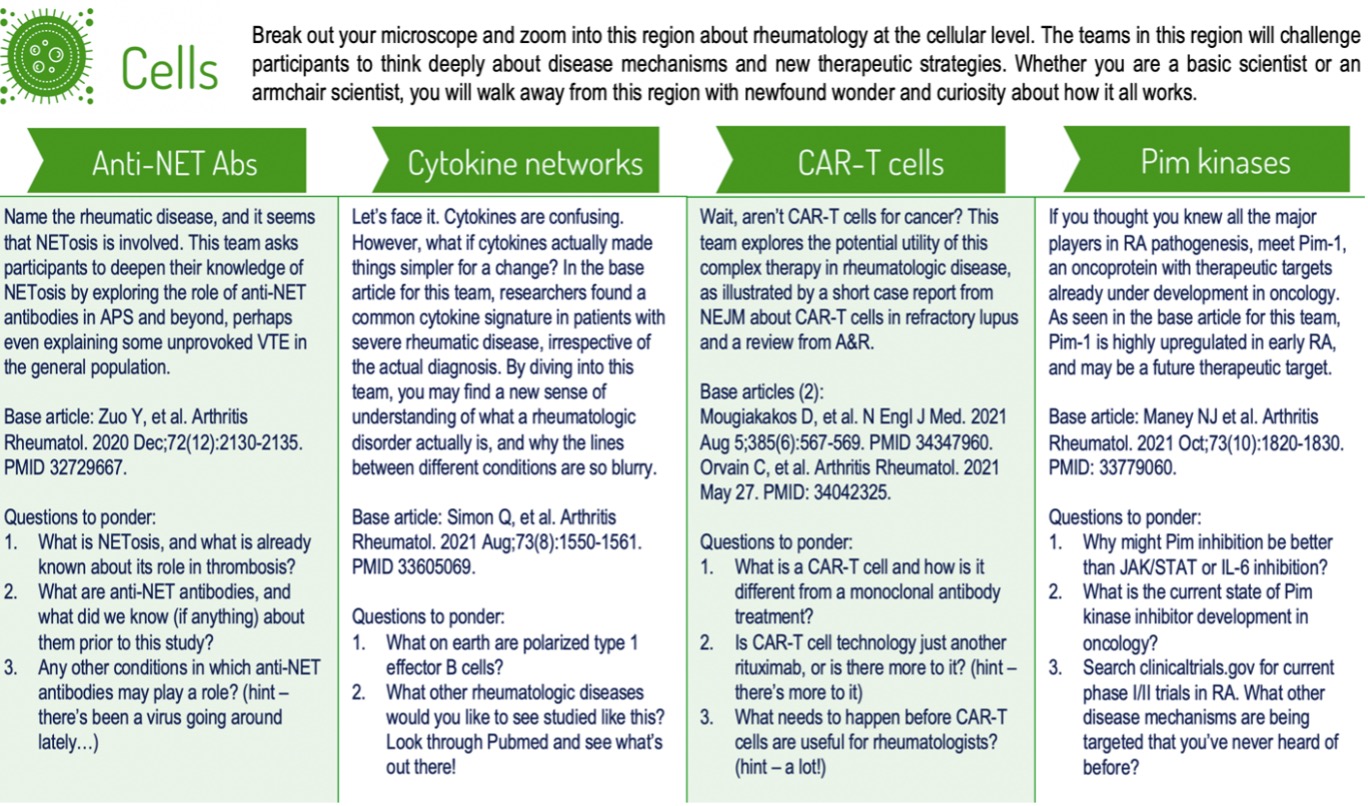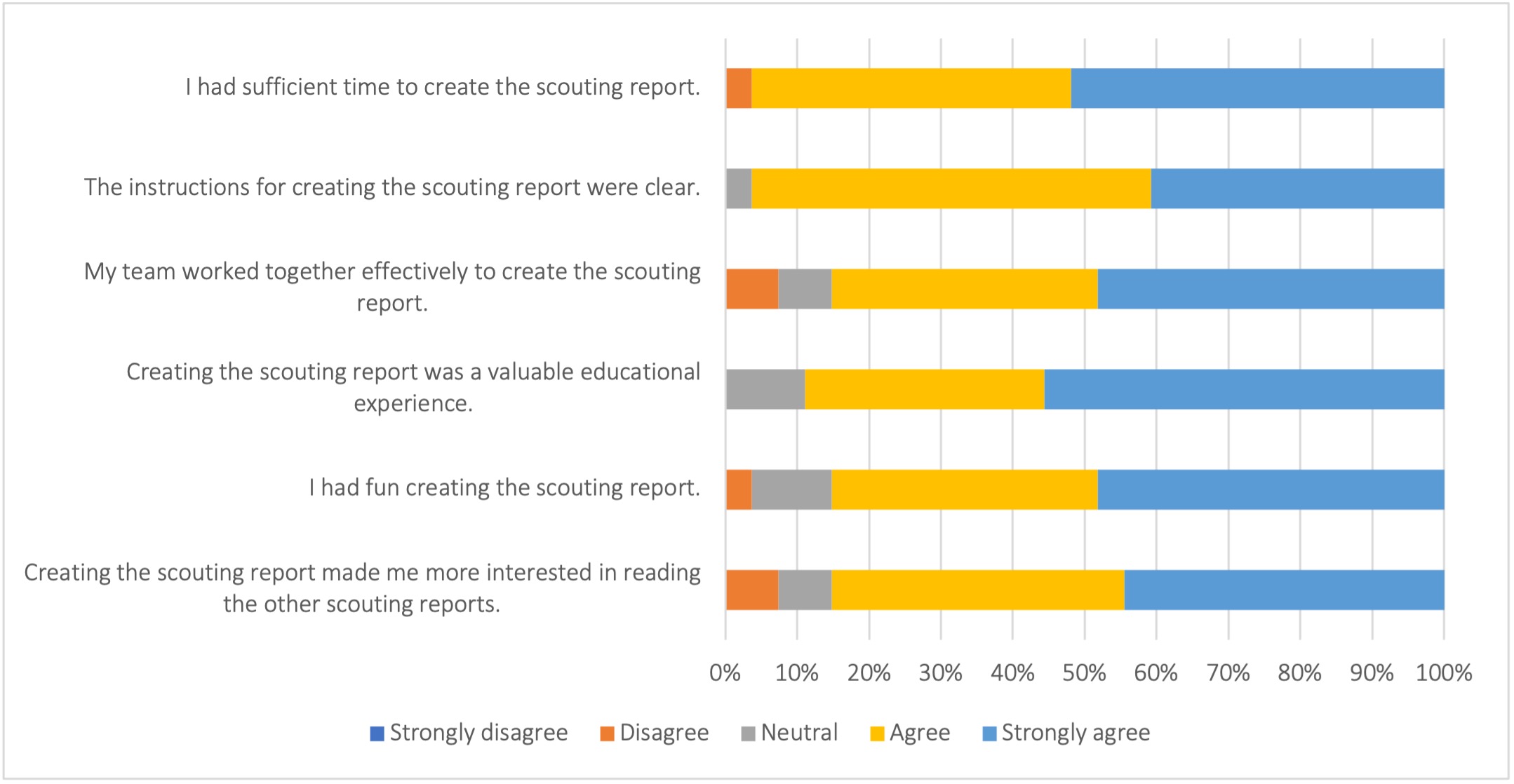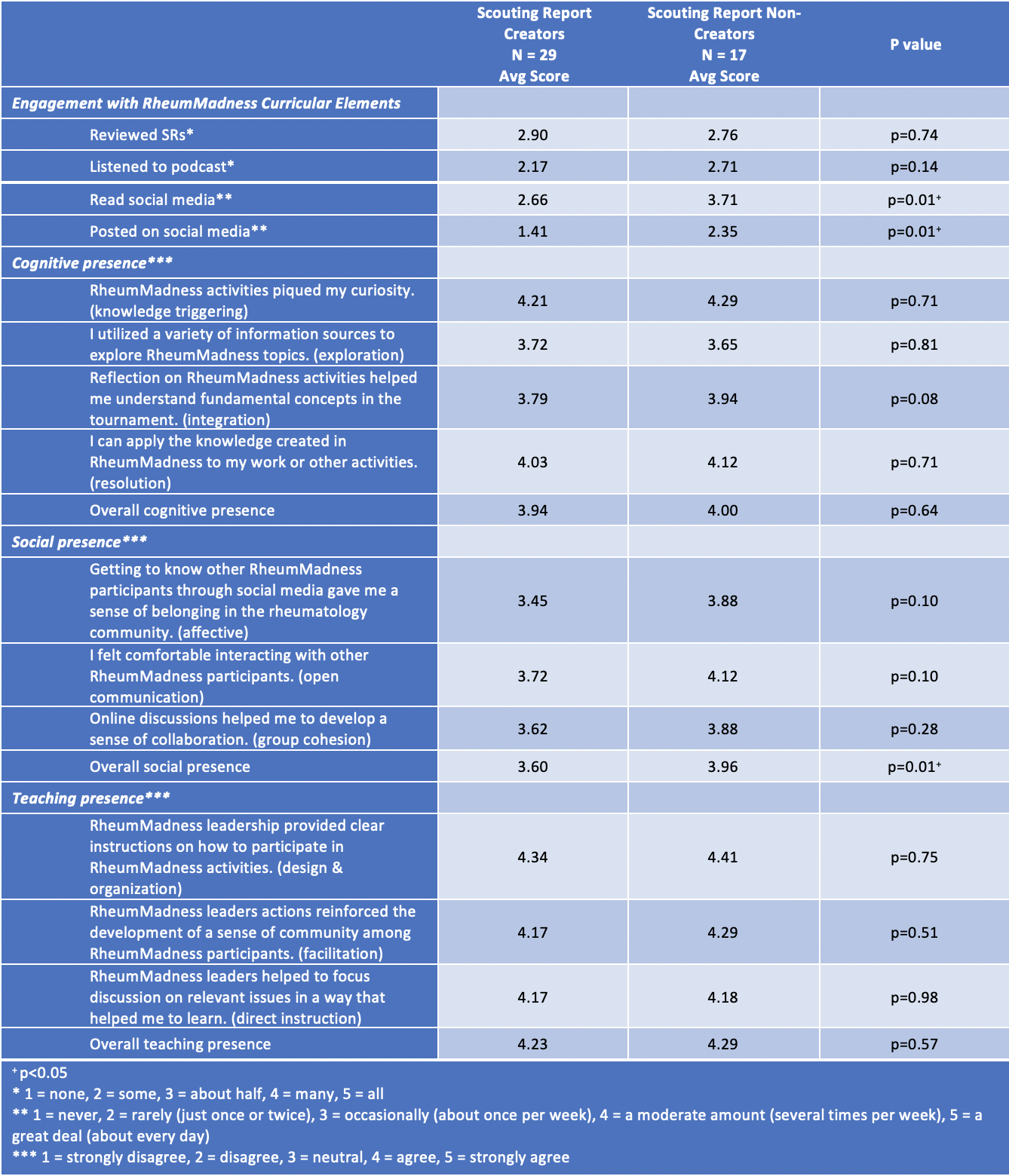Back
Poster Session A
Professional development and education
Session: (0214–0240) Professional Education Poster
0234: Scouting Reports as a Social Constructivist Teaching Tool in RheumMadness
Saturday, November 12, 2022
1:00 PM – 3:00 PM Eastern Time
Location: Virtual Poster Hall
- AG
Akrithi Garren, MD
MedStar/Georgetown Washington Hospital Center
Silver Spring, MD, United States
Abstract Poster Presenter(s)
Aki Garren1, Guy Katz2, Lauren He3, Michael Macklin4, Ben Kellogg5, Courtney Bair5, matthew Sparks5, Lisa Criscione-Schreiber5 and david leverenz5, 1MedStar/Georgetown Washington Hospital Center, Silver Spring, MD, 2Massachusetts General Hospital, Boston, MA, 3University of Chicago, Chicago, IL, 4University of Pittsburg Medical Center, Pittsburgh, PA, 5Duke University School of Medicine, Durham, NC
Background/Purpose: RheumMadness is an online social constructivist learning activity for the rheumatology community. Knowledge co-creation by learners is key to social constructivist learning. Thus, we guided the development of "scouting reports" (SR), created by RheumMadness participants, to teach others about key concepts in the tournament. In this project, we seek to understand the educational experience of SR creators in RheumMadness 2021 and 2022.
Methods: We invited rheumatology fellowship programs to create the SRs (one per program). To guide their efforts, we provided a blank SR template, an example SR, instructional videos, a SR "primer" (Figure 1), and feedback from the leadership team. We counted the number of fellows and attendings involved in SR creation (excluding leadership team). To understand the experience of SR creators, we analyzed responses on a survey sent after the 2021 and 2022 RheumMadness tournaments. The 2022 survey asked SR creators questions about their experience with SR creation. In addition, we analyzed SR creators' self-reported engagement with the curricular elements of RheumMadness and their perceived educational experience as expressed in the three presences of the Community of Inquiry framework (cognitive, social, and teaching). After aggregating responses from 2021 and 2022, we used unpaired T-tests to compare responses from fellows involved in SR creation to fellows who participated in RheumMadness but did not create a SR. This analysis excluded attendings to avoid confounding from different training levels in the two groups.
Results: In total, SR contributors included 48 authors (44 fellows, 4 faculty) from 14 fellowship programs in 2021 and 61 authors (42 fellows, 19 faculty) from 13 fellowships in 2022, resulting in 32 total SRs. Response rates of SR creators on the survey was 29% (14/48) in 2021 and 44% (27/61) in 2022. Of the 2022 respondents, over 85% agreed or strongly agreed that creating a SR was fun, educational, and increased interest in reading other SRs (Figure 2). After aggregating responses from 2021 and 2022, fellows who created a SR (n = 29) and those who did not create a SR (n = 17) reported similar engagement with reviewing other SRs and the podcast. However, those who did not create a SR had higher engagement on social media (Table 1). Likewise, fellows who created a SR and those who did not create a SR had experienced similar levels of the cognitive and teaching presences, but those who did not create a SR reported higher levels of the social presence (Table 1).
Conclusion: In 2021 and 2022, RheumMadness engaged learners from different institutions in the creation of learning resources for other participants in the tournament, consistent with social constructivist theory. Participants found SR creation to be fun and educational. Our comparison of fellows' educational experiences with RheumMadness reveals two distinct groups: (1) those who engaged with RheumMadness primarily within their own program through SR creation, and (2) those who did not create a SR but engaged with RheumMadness through social media. Regardless, both groups had a meaningful educational experience, as evidenced by high cognitive and teaching presences.
 Figure 1: Example from primer sent to SR creators responsible for the “Cells” Region of RheumMadness 2022.
Figure 1: Example from primer sent to SR creators responsible for the “Cells” Region of RheumMadness 2022.
 Figure 2: RheumMadness 2022 survey responses on participants’ experiences with scouting report creation (n = 27).
Figure 2: RheumMadness 2022 survey responses on participants’ experiences with scouting report creation (n = 27).
 Table 1: Aggregate post survey responses from RheumMadness 2021 and 2022 SR creators and SR non-creators on engagement with curricular elements of RheumMadness and perceived educational experience.
Table 1: Aggregate post survey responses from RheumMadness 2021 and 2022 SR creators and SR non-creators on engagement with curricular elements of RheumMadness and perceived educational experience.
Disclosures: A. Garren, None; G. Katz, None; L. He, None; M. Macklin, None; B. Kellogg, None; C. Bair, None; m. Sparks, Renal Research Institute, American Board of Internal Medicine, NephJC, American Journal of Kidney Diseases, Kidney360, Kidney Medicine, ASN Kidney News, KCVD Membership & Communications Committee- AHA, Elsevier- Nephrology Secrets, KCVD Scientific & Clinical Education Lifelong Learning Committee (SCILL)- AHA, NKF North Carolina; L. Criscione-Schreiber, GlaxoSmithKlein(GSK), UCB; d. leverenz, Pfizer, Rheumatology Research Fund.
Background/Purpose: RheumMadness is an online social constructivist learning activity for the rheumatology community. Knowledge co-creation by learners is key to social constructivist learning. Thus, we guided the development of "scouting reports" (SR), created by RheumMadness participants, to teach others about key concepts in the tournament. In this project, we seek to understand the educational experience of SR creators in RheumMadness 2021 and 2022.
Methods: We invited rheumatology fellowship programs to create the SRs (one per program). To guide their efforts, we provided a blank SR template, an example SR, instructional videos, a SR "primer" (Figure 1), and feedback from the leadership team. We counted the number of fellows and attendings involved in SR creation (excluding leadership team). To understand the experience of SR creators, we analyzed responses on a survey sent after the 2021 and 2022 RheumMadness tournaments. The 2022 survey asked SR creators questions about their experience with SR creation. In addition, we analyzed SR creators' self-reported engagement with the curricular elements of RheumMadness and their perceived educational experience as expressed in the three presences of the Community of Inquiry framework (cognitive, social, and teaching). After aggregating responses from 2021 and 2022, we used unpaired T-tests to compare responses from fellows involved in SR creation to fellows who participated in RheumMadness but did not create a SR. This analysis excluded attendings to avoid confounding from different training levels in the two groups.
Results: In total, SR contributors included 48 authors (44 fellows, 4 faculty) from 14 fellowship programs in 2021 and 61 authors (42 fellows, 19 faculty) from 13 fellowships in 2022, resulting in 32 total SRs. Response rates of SR creators on the survey was 29% (14/48) in 2021 and 44% (27/61) in 2022. Of the 2022 respondents, over 85% agreed or strongly agreed that creating a SR was fun, educational, and increased interest in reading other SRs (Figure 2). After aggregating responses from 2021 and 2022, fellows who created a SR (n = 29) and those who did not create a SR (n = 17) reported similar engagement with reviewing other SRs and the podcast. However, those who did not create a SR had higher engagement on social media (Table 1). Likewise, fellows who created a SR and those who did not create a SR had experienced similar levels of the cognitive and teaching presences, but those who did not create a SR reported higher levels of the social presence (Table 1).
Conclusion: In 2021 and 2022, RheumMadness engaged learners from different institutions in the creation of learning resources for other participants in the tournament, consistent with social constructivist theory. Participants found SR creation to be fun and educational. Our comparison of fellows' educational experiences with RheumMadness reveals two distinct groups: (1) those who engaged with RheumMadness primarily within their own program through SR creation, and (2) those who did not create a SR but engaged with RheumMadness through social media. Regardless, both groups had a meaningful educational experience, as evidenced by high cognitive and teaching presences.
 Figure 1: Example from primer sent to SR creators responsible for the “Cells” Region of RheumMadness 2022.
Figure 1: Example from primer sent to SR creators responsible for the “Cells” Region of RheumMadness 2022.  Figure 2: RheumMadness 2022 survey responses on participants’ experiences with scouting report creation (n = 27).
Figure 2: RheumMadness 2022 survey responses on participants’ experiences with scouting report creation (n = 27). Table 1: Aggregate post survey responses from RheumMadness 2021 and 2022 SR creators and SR non-creators on engagement with curricular elements of RheumMadness and perceived educational experience.
Table 1: Aggregate post survey responses from RheumMadness 2021 and 2022 SR creators and SR non-creators on engagement with curricular elements of RheumMadness and perceived educational experience.Disclosures: A. Garren, None; G. Katz, None; L. He, None; M. Macklin, None; B. Kellogg, None; C. Bair, None; m. Sparks, Renal Research Institute, American Board of Internal Medicine, NephJC, American Journal of Kidney Diseases, Kidney360, Kidney Medicine, ASN Kidney News, KCVD Membership & Communications Committee- AHA, Elsevier- Nephrology Secrets, KCVD Scientific & Clinical Education Lifelong Learning Committee (SCILL)- AHA, NKF North Carolina; L. Criscione-Schreiber, GlaxoSmithKlein(GSK), UCB; d. leverenz, Pfizer, Rheumatology Research Fund.

